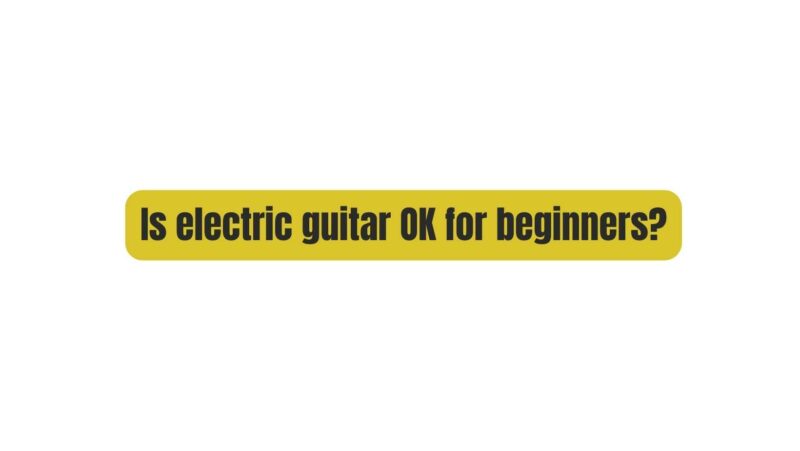Starting the journey of learning to play the guitar is an exciting adventure. However, for beginners, choosing the right type of guitar can be a daunting decision. One of the most common dilemmas is whether an electric guitar is suitable for those just starting out. In this article, we’ll explore the advantages and disadvantages of starting with an electric guitar as a beginner and provide valuable insights to help you make an informed choice.
I. The Appeal of Electric Guitars
Electric guitars are known for their allure, with their sleek designs, vibrant colors, and the promise of rocking out with powerful amplifiers. Here’s why they often attract beginners:
- Versatile Sound: Electric guitars offer a wide range of tones and styles, making them suitable for various genres, from rock and blues to jazz and pop.
- Lighter Strings: Electric guitars typically have lighter gauge strings, which can be more forgiving on beginners’ fingers.
- Easier Fretting: The low string action and narrow necks of electric guitars can make it easier for beginners to press down on the frets and produce clear notes.
- Amplification: Electric guitars need amplification, which can help beginners feel like they’re making a big sound early on.
II. The Advantages of Starting with an Electric Guitar
Starting with an electric guitar has its advantages that can be beneficial for beginners:
- Ease of Play: Electric guitars usually have thinner necks and lower string action, making them more comfortable to play, especially for those with smaller hands.
- Feedback and Distortion: Electric guitars can provide immediate feedback through amplification, helping beginners develop their technique and sound quickly.
- Motivation: The excitement of playing an electric guitar with amplification can motivate beginners to practice more regularly.
- Wide Range of Styles: Electric guitars are versatile and can be used in various musical styles, allowing beginners to explore their musical preferences.
III. Challenges and Considerations
While electric guitars have their appeal, beginners should also consider the following challenges:
- Cost: Electric guitars require additional equipment, such as an amplifier and cables, which can increase the initial cost compared to an acoustic guitar.
- Maintenance: Electric guitars need regular maintenance, including adjustments to the amplifier and effects pedals, which can be overwhelming for beginners.
- Noise: Amplification can be noisy, which may not be suitable for everyone, especially if you have close neighbors or live in a shared space.
- Technical Learning Curve: Electric guitars introduce beginners to various technical aspects, including amplifiers, effects pedals, and pickups, which can be confusing initially.
IV. Tips for Beginners Considering an Electric Guitar
If you’re a beginner considering starting with an electric guitar, here are some tips to help you make the most of your decision:
- Try Before You Buy: Visit a music store and try out different electric guitars to find one that feels comfortable and suits your style.
- Budget Consideration: Consider your budget, not just for the guitar but also for the necessary accessories like an amplifier, cables, and possibly effects pedals.
- Online Resources: Take advantage of online tutorials, lessons, and forums to learn about electric guitars and their maintenance.
- Practice Space: Ensure you have a suitable practice space where you can play your electric guitar without causing disruptions.
V. Electric vs. Acoustic for Beginners
Comparing electric and acoustic guitars for beginners can help clarify your choice:
- Acoustic Advantages: Acoustic guitars are more portable, require less equipment, and are generally less expensive for beginners. They’re also great for building finger strength and learning basic techniques.
- Electric Advantages: Electric guitars offer versatility, making them suitable for various musical styles. They can be more forgiving on the fingers and can motivate beginners with their amplified sound.
VI. Conclusion: The Right Guitar for You
In conclusion, whether an electric guitar is okay for beginners depends on your musical goals, preferences, and circumstances. Electric guitars offer exciting possibilities for those eager to dive into the world of amplified music, but they come with unique challenges and costs. If you’re drawn to the sound and style of electric guitars and are willing to invest the time and resources to learn, there’s no reason why you can’t start your musical journey with one. However, if simplicity, portability, and budget are your primary concerns, an acoustic guitar may be a more practical choice. Ultimately, the right guitar for you is the one that inspires you to practice, learn, and create music, regardless of its type. Embrace your choice, enjoy the journey, and let your passion for music be your guide as you explore the world of guitar playing.


